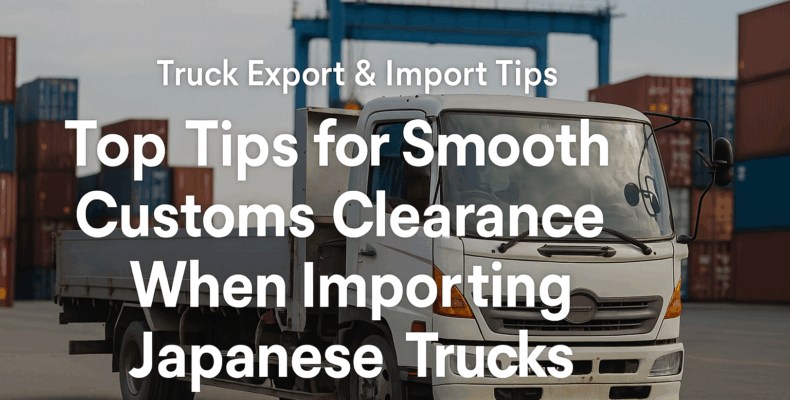🚛 Truck Export & Import Tips: Tips for a Smooth Customs Clearance Process
Importing a used Japanese truck is a great way to boost your business. However, many importers face delays due to missing paperwork or miscommunication at customs. Fortunately, by preparing properly, you can make the process easy and stress-free.
In this article, we’ll share practical advice for smooth customs clearance.
👉 Top 5 Trusted Japanese Used Truck Exporters for Global Buyers
🌍 Why Smooth Customs Clearance Matters
Wherever you’re importing—Africa, the Caribbean, or Southeast Asia—your truck must go through customs clearance. This is the last step before you receive your vehicle. Done right, it saves time, cost, and hassle.
On the other hand, a mistake in paperwork or process may lead to:
-
Long delays at port
-
Storage or demurrage charges
-
Rejected or returned shipments
✅ Tips for Fast and Hassle-Free Customs Clearance
Follow these important steps to avoid problems and clear customs smoothly.
1. Prepare All Required Documents Early
The key documents typically include:
-
Bill of Lading (B/L)
-
Export Certificate (Deregistration Certificate)
-
Commercial Invoice
-
Inspection Certificate (if required)
Ensure every document is accurate and consistent.
2. Hire a Licensed Clearing Agent
An experienced clearing agent understands local regulations. They can assist with:
-
Filing paperwork correctly
-
Calculating import duties and taxes
-
Speeding up customs release
A good agent is your most valuable partner during clearance.
3. Understand Import Rules in Your Country
Each country has its own import laws. For example:
-
Kenya requires JEVIC inspection
-
Zambia applies carbon taxes
-
Jamaica needs an import license
Check the customs website of your government or ask your clearing agent for guidance.
4. Track Your Shipment Until It Arrives
Most shipping lines offer tracking. By knowing exactly when the ship will dock, you can prepare and act quickly. Don’t let your truck sit too long at the port.
5. Have Funds Ready for Import Charges
Typical charges include:
-
Import duties
-
VAT or GST
-
Port service fees
-
Environmental taxes (if applicable)
Paying these fees immediately avoids unnecessary delays.
6. Inspect the Truck Upon Arrival
Before taking full possession, check the truck carefully. Look for shipping damage. Take photos as proof. If you purchased marine insurance, this step is important for claims.
7. Keep Copies of All Important Documents
Even after your truck clears customs, you’ll need the documents for vehicle registration. Keep digital and printed copies in a safe place.
📝 Conclusion
Clearing customs doesn’t have to be stressful. If you prepare your documents, work with a reliable clearing agent, and stay informed, your truck will be ready for use in no time.
👉 Top 5 Trusted Japanese Used Truck Exporters for Global Buyers
